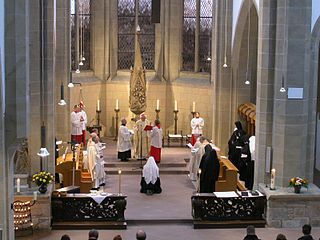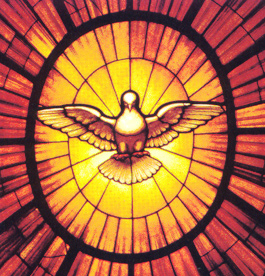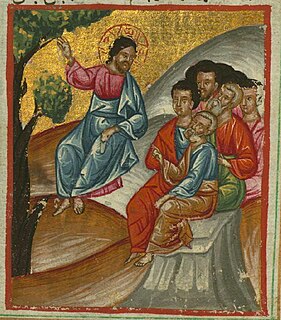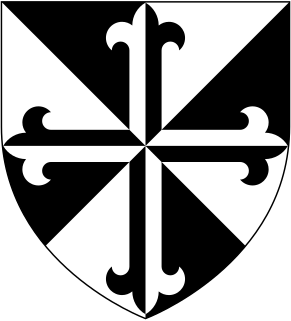Holy Obedience means two things: 1) Jesus' obedience unto death that makes atonement and reparation for mankind's disobedience (sins) [1] and 2) Christian obedience to God in imitation of and share in Jesus' obedience. [2]
Holy Obedience means two things: 1) Jesus' obedience unto death that makes atonement and reparation for mankind's disobedience (sins) [1] and 2) Christian obedience to God in imitation of and share in Jesus' obedience. [2]
Obedience, from the Latin obêdire, ("to hearken to"), [3] is "the moral virtue that inclines the will to comply with the will of another who has the right to command." [4] Christ is the exemplar of holy obedience "becoming obedient to death, even death on a cross." [5] "Son though he was, he learned obedience from what he suffered; and when he was made perfect, he became the source of eternal salvation for all who obey him." (Hebrews 5:8) [6]
Christian obedience is a free choice to surrender one's will to God, [6] and an act of homage. [3]
Amongst the moral virtues obedience enjoys a primacy of honour. The reason is that the greater or lesser excellence of a moral virtue is determined by the greater or lesser value of the object which it qualifies one to put aside in order to give oneself to God. Now amongst our various possessions, whether goods of the body or goods of the soul, it is clear that the human will is the most intimately personal and most cherished of all. So it happens that obedience, which makes a man yield up the most dearly prized stronghold of the individual soul in order to do the good pleasure of his Creator, is accounted the greatest of the moral virtues. [3]
The sacrament of confirmation seals one with the Holy Spirit, [7] who grants one all the virtues - Theological Virtues, Fruits of the Holy Spirit, and Gifts of the Holy Spirit - necessary to obey God. [8]
Thomas Aquinas said that God is to be obeyed in all things, while human authorities are to be obeyed in certain things. [9] All Catholics, the church teaches, must practice obedience of faith: assent of faith to the magisterium and divine revelation (word of God), and religious submission to the Pope and other bishops. This includes obedience to one's conscience [10] and obedience to valid law. [11] As part of ordination, diocesan priests and deacons promise obedience to God and to their bishops. [12] Priests who are part of a religious order (along with all religious sisters and brothers) profess vows of obedience to the authorities of their religious community. Children obey their parents, because honouring parents is part of honouring God, and is required by God's commandment. It is the recognition of the authority of God vicariously exercised through a human agent that confers upon the act of obedience its special merit. [3]
Obedience is one of the evangelical counsels. [13] The desire for worldly power and honour poses a hindrance to the soul from its true aim and vocation, and delays it from becoming entirely conformed to the will of God, and is therefore addressed by the counsel of holy obedience. [14]
Under the Rule of Saint Benedict and that of Pachomius the Great, holy obedience served as a sort of education in community life, under more experienced monks. [15] Francis of Assisi said, "The true obedient Religious is like unto a knight well armed and mounted the which overcometh and breaketh the ranks of his enemies, safely and without fear, because none of them can hurt him." [16]
Consecrated religious vow obedience to their superiors. [17] Obedience is not vowed absolutely, and without limit, but according to the rule of each order, for a superior cannot command anything foreign to, or outside, the rule (except in so far as he may grant dispensations from the rule).
The sacrifice of one's own independence and one's own will presupposes a spirit of self-denial and mortification; the readiness to accept a common rule which adapts itself to the desires and tastes of others is a mark of the charity. By reason of the vow of obedience and of the religious profession a deliberate act of obedience and submission adds the merit of an act of the virtue of religion. Aquinas makes it clear that the vow of obedience is the chief of the vows of religion. [15]
Mary exemplifies obedience of faith by her assent of faith at the Annunciation: "Let it be done to me according to your word." [18] Catholic martyrs obey Jesus and the church unto suffering - such as Saint Patrick, who suffered abuse for his evangelization [19] - and unto death - such as Mateo Correa Magallanes, who died rather than violate the Seal of the Confessional in the Catholic Church. [20]

Chastity, also known as purity, is a virtue related to temperance. Someone who is chaste refrains either from sexual activity considered immoral or any sexual activity, according to their state of life. In some contexts, for example when making a vow of chastity, chastity means the same as celibacy.
Theological virtues are virtues associated in Christian theology and philosophy with salvation resulting from the grace of God. Virtues are traits or qualities which dispose one to conduct oneself in a morally good manner. Traditionally they have been named Faith, Hope, and Charity (Love), and can trace their importance in Christian theology to Paul the Apostle in 1 Corinthians 13, who also pointed out that “the greatest of these is love.”

Piety is a virtue which may include religious devotion or spirituality. A common element in most conceptions of piety is a duty of respect. In a religious context piety may be expressed through pious activities or devotions, which may vary among countries and cultures.

Penance is any act or a set of actions done out of repentance for sins committed, as well as an alternate name for the Catholic, Lutheran, Eastern Orthodox, and Oriental Orthodox sacrament of Reconciliation or Confession. It also plays a part in confession among Anglicans and Methodists, in which it is a rite, as well as among other Protestants. The word penance derives from Old French and Latin paenitentia, both of which derive from the same root meaning repentance, the desire to be forgiven. Penance and repentance, similar in their derivation and original sense, have come to symbolize conflicting views of the essence of repentance, arising from the controversy as to the respective merits of "faith" and "good works". Word derivations occur in many languages.

The Westminster Confession of Faith is a Reformed confession of faith. Drawn up by the 1646 Westminster Assembly as part of the Westminster Standards to be a confession of the Church of England, it became and remains the "subordinate standard" of doctrine in the Church of Scotland and has been influential within Presbyterian churches worldwide.

In Christian hamartiology, eternal sins, unforgivable sins, unpardonable sins, or ultimate sins are sins which will not be forgiven by God. One eternal or unforgivable sin, also known as the sin unto death, is specified in several passages of the Synoptic Gospels, including Mark 3:28–29, Matthew 12:31–32, and Luke 12:10, as well as other New Testament passages including Hebrews 6:4–6, Hebrews 10:26–31, and 1 John 5:16.

Religious vows are the public vows made by the members of religious communities pertaining to their conduct, practices, and views.

The seven gifts of the Holy Spirit are an enumeration of seven spiritual gifts first found in the book of Isaiah, and much commented upon by patristic authors. They are: wisdom, understanding, counsel, fortitude, knowledge, piety, and fear of the Lord.

The term third order signifies, in general, lay members of Christian religious orders, who do not necessarily live in a religious community such as a monastery or a nunnery, and yet can claim to wear the religious habit and participate in the good works of a great order. Roman Catholicism, Lutheranism and Anglicanism all recognize third orders.
In the Catholic Church, the vow of obedience is one of the three vows of professing to live according to the evangelical counsels. It forms part of the religious vows that are made both by members of the religious institutes and diocesan hermits.
Within Christianity, faith, in one sense, is often discussed in terms of believing God's promises, trusting in his faithfulness, and relying on God's character and faithfulness to act. Some denominations believe in the New Covenant and in the doctrine of salvation by faith alone. According to most Christian traditions and denominations, Christian faith requires a belief in the resurrection of Jesus, and the Agony in the Garden which Jesus states is the plan of God the Father.

Consecrated life is a state of life in the Catholic Church lived by those faithful who are called to follow Jesus Christ in a more exacting way. It includes those in institutes of consecrated life, societies of apostolic life, as well as those living as hermits or consecrated virgins/widows.
Heroic virtue is a phrase coined by Augustine of Hippo to describe the virtue of early Christian martyrs and used by the Catholic Church. The Greek pagan term hero described a person with possibly superhuman abilities and great goodness, and "it connotes a degree of bravery, fame, and distinction which places a man high above his fellows". The term was later applied to other highly virtuous persons who do extraordinary good works.
The Missionaries of Our Lady of La Salette are a religious congregation of priests and brothers in the Latin Church. They are named after the apparition of Our Lady of La Salette in France. There is also a parallel religious community of sisters called the Missionary Sisters of Our Lady of La Salette. A lay fraternal group of associates also works in cooperation with the vowed religious. The Missionaries are dedicated to making known the message of Our Lady of La Salette, a call to healing of inner brokenness and personal reconciliation with God, especially as found in the first three commandments. The missionaries are popularly known as "the La Salettes."

Matthew 8:20 is the 20th verse in the eighth chapter of the Gospel of Matthew in the New Testament of the Christian Bible. It reveals the homelessness of Jesus and his followers.

In Christianity, the three evangelical counsels or counsels of perfection are chastity, poverty, and obedience. As stated by Jesus in the canonical gospels, they are counsels for those who desire to become "perfect". The Catholic Church interprets this to mean that they are not binding upon all, and hence not necessary conditions to attain eternal life (heaven), but that they are "acts of supererogation" exceeding the minimum stipulated in the biblical commandments. Catholics who have made a public profession to order their life by the evangelical counsels, and confirmed this by public vows before their competent church authority, are recognised as members of the consecrated life.

The Third Order of Saint Dominic, also referred to as the Lay Fraternities of Saint Dominic or Lay Dominicans since 1972, is a Roman Catholic third order affiliated with the Dominican Order. There is also an Anglican Order of Preachers (Dominicans).

Catholic moral theology is a major category of doctrine in the Catholic Church, equivalent to a religious ethics. Moral theology encompasses Catholic social teaching, Catholic medical ethics, sexual ethics, and various doctrines on individual moral virtue and moral theory. It can be distinguished as dealing with "how one is to act", in contrast to dogmatic theology which proposes "what one is to believe".
"The New Eve" is a devotional name for The Virgin Mary, mother of Jesus Christ. It is possibly the most ancient doctrinal title of Mary in the Early Church. Both Eastern and Western Church fathers have expressed the doctrinal idea since the apostolic age, and it comprised a universal teaching of the Early Church. The doctrine expresses Mary's unique and necessary participation in the economy of salvation, particularly her faith as displayed at the annunciation of Angel Angel Gabriel, which facilitates the incarnation of Christ and the redemption of humanity.

Religion is a distinct moral virtue whose purpose is to render God the worship due to Him as the source of all being and the giver of all good things. As such it is part of the cardinal virtue of Justice, and falls under obedience to the First Commandment.